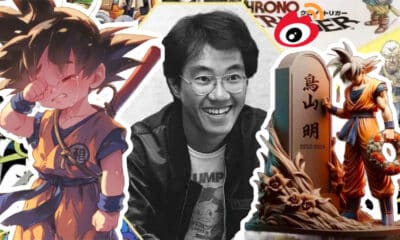China Arts & Entertainment
Chinese 3D Street Artist Qi Xinghua Brings Concrete to Life : “A City Needs Its Tattoos”
Chinese 3D artist Qi Xinghua (齐兴华) uses his skills to turn bleak walls in Chinese cities into stunning works of art – he brings concrete to life. But his street art often does not last, as Qi faces different forces that work against him and his work. On social media platform Weibo, Qi’s fans can admire his art online, even if it has already disappeared from the streets.
Published
8 years agoon
By
Diandian GuoChinese 3D artist Qi Xinghua (齐兴华) uses his skills to turn bleak walls in Chinese cities into stunning works of art – he brings concrete to life. But his street art often does not last, as Qi faces different forces that work against him and his work. On social media platform Weibo, Qi’s fans can admire his art online, even if it has already disappeared from the streets.
“The crocodile is gone again,” – Chinese artist Qi Xinghua posted on his Weibo account on August 25. Earlier this summer, he had transformed the dilapidated part of a Beijing brick wall into a cheeky crocodile, writing: “Beijing has a well-known red brick wall that’s broken. It looks like a scar. I used the nighttime to make it more beautiful. I hope to show that what’s broken can also be interesting. A city needs its tattoos.” But now, the crocodile is gone – the painting’s layer smashed into pieces.

On Sina Weibo, painter Qi Xinghua (@齐兴华) describes himself as “China’s first 3D artist” (“中国首位3D画艺术家”). The artist was born in Heilongjiang in 1982. He was inspired by western 3D sidewalk chalk artists, and soon developed an interest to do the same. He enrolled in the Central Academy of Fine Arts, and started focusing on multi-dimensional art in 2002.
“Nature confronts me with a difficult problem, and I offer her a humorous solution”.”
Since he fully dedicated himself to his 3D art work in 2010, Qi has become a much-praised artist and a four-time Guinness World record holder for making the world’s largest 3D paintings. He is renowned for his incredible designs that can be mind-blowing, often leaving people wondering what is real and what is fantasy.
It is especially because of his record-winning work ‘The Lion’s Gate Gorge’ (狮门峡谷) that Qi received much media attention, with the 3D effect being so strong that some people who stood on the painting even became dizzy.
According to Qi, he uses a technique called ‘reverse version’ or ‘inverse-perspective’. As he told China.org: “From our normal vision, nearby objects are big and far away ones are small. I use the opposite method to make far away objects big and close objects small. In this way, a two-dimensional painting turns three-dimensional.”
 The Lion’s Gate Gorge (狮门峡谷) by Qi Xinghua; the world’s largest 3D (anamorphic) painting on display in Guangzhou.
The Lion’s Gate Gorge (狮门峡谷) by Qi Xinghua; the world’s largest 3D (anamorphic) painting on display in Guangzhou.

 ‘The Waterfall’ by Qi Xinghua is a depiction of a waterfall in a busy street, that seems to be protruding from the center.
‘The Waterfall’ by Qi Xinghua is a depiction of a waterfall in a busy street, that seems to be protruding from the center.
Apart from working on his grand 3D projects, Qi also works on his street art with which he creatively turns bleak walls in the urban scenery into pieces of art, bringing messages of happiness, humour, and love of life.
[rp4wp]
For example, Qi has turned the holes in the wall of a deserted basement into Baymax from Disney’s Big Zero.
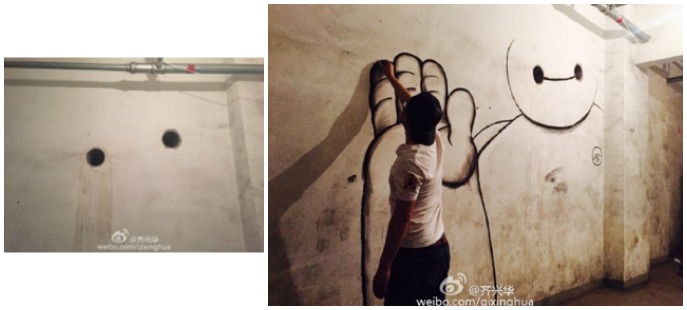
Or he placed two pandas on two sides of a dilapidated brick wall.

Sometimes Qi gives his work original names, such as the project (image below) that is titled “Sharp Items will Hurt Grandpa’s Hand (尖锐物品会划伤爷爷的手)”.
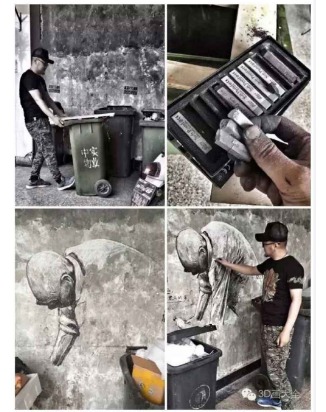
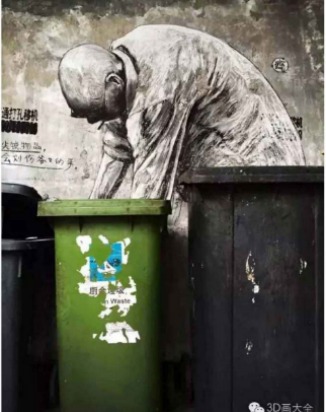
Throughout the years, Qi Xinghuai has attracted many fans with his wall paintings. Apart from the 172,000+ followers he has on his Weibo account, many admirers also go around the city to seek for his work. Qi receives many invitations to decorate walls in different places. “I like this recreation of old walls”, Qi says on Weibo: “It is like a cooperation with nature. Nature confronts me with a difficult problem, and I offer her a humorous solution”.
“Seize the moment and pose with my work before it’s gone.”
On Weibo, Qi shares his working process with his followers. Either with paint or chalk, Qi adjusts his work to the place it is located. “I found this wall today,” he recently wrote on his account: “And I got excited. I used the shape of the wall’s broken parts to paint a face.” He then shared the results with his fans.

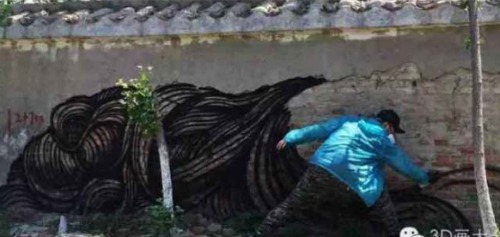



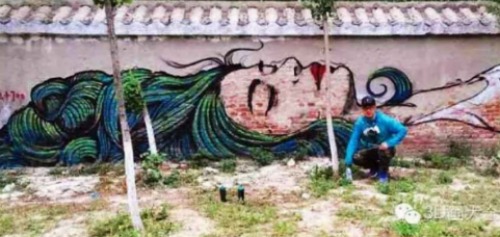
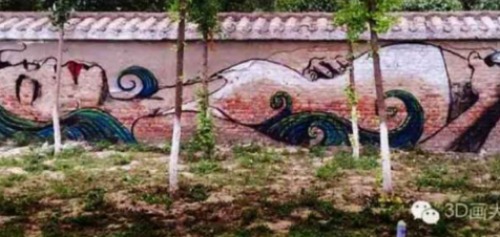

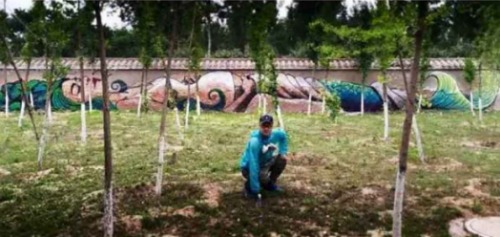
Qi says he wants to “beautify the scars of the city” by focusing on broken walls and dilapidated parts of different cities within China.
“Seize the moment and pose with my work before it’s gone,” Qi tells his social media followers, who also send in their own pictures with Qi’s different pieces, from Beijing to Nanjing and elsewhere.

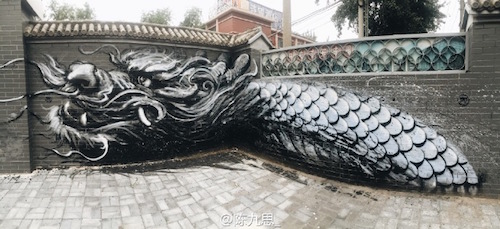
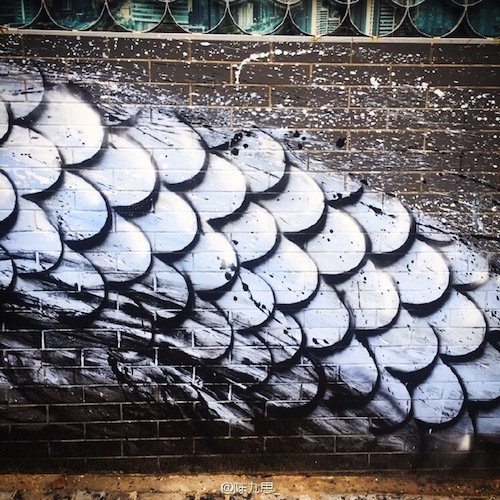
Despite his popularity, however, the humor and beauty of Qi’s wall paintings usually do not last long, as Qi faces forces from within local communities and governments that work against his work and destroy it.
“It’s not the seed that’s lacking, it’s the soil.”
“I have been reported again,” Qi writes. Besides the recent removal of Qi’s crocodile, many other works have also been removed. The pandas, for example, have been “redecorated” with local advertisements. Another work titled “Sweetie, your bite is hurting daddy” (“宝贝,你咬疼爸爸了”), which depicts a baby lion biting the back of a father lion (Father and Son Lion), has been covered with paint and graffiti.
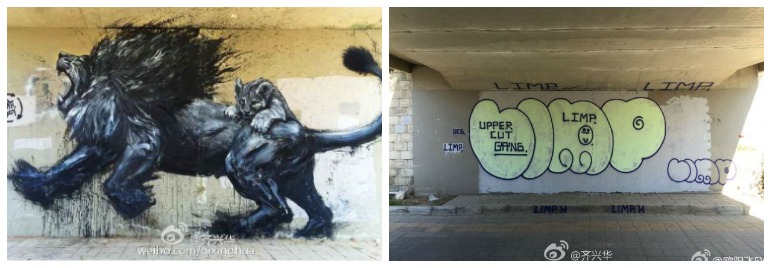
Besides people covering his work with their own advertisements or graffiti, Qi also faces the opposition of local land owners or city regulators. While finishing the crocodile, Qi posted on Weibo one picture of a police car and another one of himself running away from his work. Although he did not mention how and why the crocodile was destroyed, a picture of him sitting among the smashes of the painting suggests that it has been removed with force.
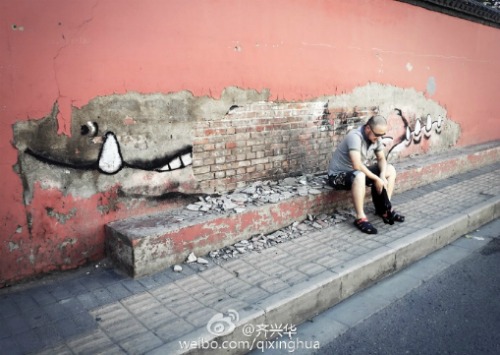
“Why am I reported? Nobody cares about people posting advertisements on walls, nobody fixes the walls that are broken. It grieves me. Tell me what city would like it, and I will come and paint,” Qi wrote on July 22. Faced with setbacks of him being reported and his paintings being removed, Qi recently also wrote that “perhaps it is not the seed that is lacking, but the soil”.
It might need more time before a relatively new phenomenon like street art will be accepted and accommodated by Chinese municipalities and citizens alike. In Shanghai and Shenzhen, efforts to regulate street performers were only introduced as recent as 2014. As for 3D and graffiti artists, their legitimate existence still relies on consensus between the artist, their local municipality and the residents, as there are currently no clear regulations. As The Diplomat wrote in 2015, China strictly controls graffiti that signals political dissent, but sometimes promotes graffiti that beautifies the city. But in the present situation, Qi’s work will keep on facing an uncertain future.
On Weibo, many netizens are hopeful about the future of street art. “It takes time to obtain rich soil,” one netizen writes: “It might be slow, but it will come.”

In the meantime, Qi Xinghuai refuses to give up his street art activities. After the disappearance of his Father and Son Lion work, Qi wrote on Weibo: “I want to revive them, let them appear on the street again, with undestroyable spirit.”
-By Diandian Guo and Manya Koetse
Follow @WhatsOnWeibo
©2016 Whatsonweibo. All rights reserved. Do not reproduce our content without permission – you can contact us at info@whatsonweibo.com.
Diandian Guo is a China-born Master student of transdisciplinary and global society, politics & culture at the University of Groningen with a special interest for new media in China. She has a BA in International Relations from Beijing Foreign Language University, and is specialized in China's cultural memory.

China Society
Weibo Watch: Going the Wrong Way
About how one delivery driver’s plea for leniency shed light on challenges and struggles faced by millions of food delivery workers, and more must-know trends.
Published
2 months agoon
August 22, 2024
PREMIUM NEWSLETTER | ISSUE #35
This week’s newsletter:
◼︎ 1. Editor’s Note – Going the wrong way
◼︎ 2. What’s New and Noteworthy – A closer look at featured stories
◼︎ 3. What’s Trending – Hot highlights
◼︎ 4. What’s Noteworthy – Young woman’s lonely death in rented apartment
◼︎ 6. What’s Popular – Fan Zhendong’s pluche toys
◼︎ 7. What’s Memorable – Ren Zhiqiang’s Weibo exit
◼︎ 8. Weibo Word of the Week – Fandom-ization
Dear Reader,
“Apology! Apology!” Dozens of delivery drivers chanted, standing together in front of Hangzhou’s Xixi Century Square. The group of workers, mostly men, had gathered in front of the complex after learning about an incident that took place just hours earlier.
One of their colleagues, a young delivery driver for the Meituan platform named Wang, had accidentally damaged a fence while trying to enter the complex to deliver a food order on August 12. The security guard stopped him and allegedly demanded 200 yuan ($28) in compensation. Onlookers captured a video showing Wang kneeling before the guard, pleading for leniency. He could not afford the fee nor the kerfuffle—it was peak lunch hour, and he needed to deliver his order on time.

The image that went viral on the afternoon of August 12.
The incident immediately went viral in WeChat groups.1 The image of the delivery driver on his knees, hands in his lap, helplessly looking up at the security guard, resonated with many delivery workers, sparking anger. Members of the delivery community decided to gather at the scene and protest the way their colleague had been treated.
As more delivery drivers arrived, tensions escalated (video). At least twenty police officers, including a specialized police unit, were called in to deescalate the situation, and the security guard was rushed away for his own safety.
That same night, local authorities issued a notification about the incident, urging people to remain calm and show more tolerance and understanding during these blazing hot summer days.
But the simmering tension beneath the surface runs deeper than just the summer heat.
In recent years, many viral videos have captured the hardships faced by Chinese food delivery workers, who endure scorching heat, heavy rain, and thunderstorms to deliver their orders. On August 21, a delivery driver in Pingyang collapsed while picking up a food order at a restaurant but insisted on completing the delivery (he was eventually taken to the hospital by ambulance). Other videos on platforms like Douyin show delivery riders breaking down during work.
The pressure they face is real, and the work they do is intense. China’s main food delivery platforms, Meituan and Ele.me, backed by tech giants Tencent and Alibaba, employ a combined 10 million delivery drivers. Their daily work is monitored by algorithmic management tools. The workload is high, the overwork is severe, the income is low, and the conditions are often unsafe.
Most of these workers are lower-educated migrant workers from rural areas who were already in vulnerable positions before taking these jobs. They face challenges such as limited job opportunities, inadequate medical care, poor nutrition, and sometimes language barriers or social alienation in China’s urban jungle.2 The digital control makes their work stressful—a late order or bad review can cost them income.
Recent studies show that these factors make China’s food delivery drivers highly susceptible to anxiety and depression. One study focusing on urban delivery drivers in Shanghai found that 46% of the drivers surveyed reported anxiety symptoms, and 18% experienced depression.3
While the recent Hangzhou incident and other viral moments have drawn attention to the stressful working conditions and weak social status of China’s food delivery workers, a new Chinese movie presents a different perspective on the gig economy.

One of the movie posters for Upstream (2024).
Upstream “逆行人生” (Nìxíng Rénshēng), a movie by director and star actor Xu Zheng (徐峥), was released on August 9. The story revolves around former programmer Gao Zhilei—played by Xu himself—who loses his job and savings. To support his family and ill father, he takes up a job as a delivery worker to survive.
The Chinese title of the movie, 逆行人生, translates to “a life against the current.” The term 逆行 (nìxíng) literally means ‘to go the wrong way’ or ‘to move in the opposite direction,’ and it has been translated as ‘upstream’ in this case. Since early 2020, Chinese state media have used the term 逆行者 nìxíngzhě, “those going against the tide” to refer to frontline workers and everyday heroes who made significant contributions or sacrifices for society, particularly during the pandemic or in emergencies such as forest fires.
Although Upstream does highlight some of the struggles faced by Chinese gig workers, it is largely a feel-good movie that avoids a deeper exploration of the marginalized status and precarious work conditions of gig workers. The title and story align with the narrative promoted by official media about China’s food delivery workers, especially during the pandemic when their work was extra demanding. Instead of lobbying for better labor conditions, they are praised as heroic and altruistic; as noble national heroes who act for the greater good. As one driver quoted in a study by Hui Huang put it: “They treat us as heroes in the media, but as slaves in reality.”4
This sentiment also plays a role in the public’s reception of Upstream, as discussed in a recent article by Sixth Tone. Many feel that the film exploits the struggles of China’s gig workers for entertainment and profit rather than genuinely advocating for their rights and well-being. Turning such harsh realities into a feel-good narrative is seen by some as “the wrong way” rather than “upstream.” Some have even described it as “rich people acting poor and making the poor pay for it.”
One Zhihu user placed the actual film poster next to an alternative version featuring delivery driver Wang in a vulnerable, knee-down position, which powerfully symbolizes how many delivery drivers perceive their weak status in society. The official poster says, “August 9 – auspicious/timely delivery,” while the alternative poster states, “August 12 – delivery not possible.”

Photo uploaded by 芒果味跃迁引擎 on Zhihu
However, there is an upside to the heightened attention on China’s food delivery workers: increased awareness. For example, the absurdity of relying on algorithms for their work is now sparking important discussions.
Delivery algorithms put pressure on riders by calculating precise delivery times based on ideal conditions, leaving little room for traffic delays, staircases, extreme weather, or restaurant preparation times. Riders can get caught in “algorithm traps” (算法陷阱) because the faster they work, the stricter the algorithm tightens delivery windows, and they may face penalties or reduced earnings if they fail to meet the expected times.
The fact that, through Upstream and the Hangzhou incident, people are now acknowledging the pressure that Meituan and Ele.me drivers face under such digital systems is already a big improvement from 2019, when debates centered on whether or not you should say “thank you” to acknowledge the service provided by delivery drivers.
“Maybe some parts of this film don’t fully connect with reality,” author Yan Lingyang (晏凌羊) wrote on Weibo about Upstream: “But under the current system, I think it’s already quite daring. It reflects various issues such as the economic downturn, housing bubbles, corporate burnout [involution], low wages for grassroots workers, lack of rights protection, and algorithm traps.”
Chinese blogger Cui Zijian (崔紫剑) recently also spoke out against the exploitation of drivers by platform companies, arguing that algorithms should be improved and suggesting that delivery riders be included in unions.
While the reception of Upstream and the Hangzhou delivery driver protest might seem to indicate that things are going the wrong way, the increased awareness actually points in the right direction—toward greater understanding of the challenging situation faced by millions of workers.
I’d love to dive deeper into topics such as these that are so relevant in everyday society and show how digital platforms impact the lives of people. Since I’m always reporting the latest trends, it often leaves little room for the more in-depth articles and overviews I’d love to write for you about the issues behind China’s hot topics & tech developments. Because of this, I’ve decided to gradually shift my focus toward deeper dives instead of shorter trend articles for What’s on Weibo. I’ll still provide timely updates on the latest trends through the Weibo Watch newsletter. I’m currently brainstorming how to make this transition, and I’ll keep you involved as I work on continuing to deliver insightful content. Finding the right balance between covering current trends and providing more contextual analyses can be challenging, but I can’t complain—thankfully, no algorithms are chasing me.
Miranda Barnes has contributed to the compilation and interpretation of the topics featured in this week’s newsletter. Ruixin Zhang has authored the insightful fan culture article, and contributed to the word of the week. As always, if you have any observations or ideas you’d like to share, please don’t hesitate to reach out to me.
Best,
Manya Koetse
(@manyapan)
1 The initial story that went viral in WeChat groups (links of screenshots) claimed that the delivery driver was a woman, and that the security guard had forced her to kneel. This detail intensified the outrage. However, it was later revealed that the driver was actually a thin, male worker who knelt voluntarily, in hopes of speeding up the process.
2 See Peng, Yuxun, et al., “Status and Determinants of Symptoms of Anxiety and Depression among Food Delivery Drivers in Shanghai, China,” International Journal of Environmental Research and Public Health 19, no. 20 (2022): 1; and Hui Huang, “Riders on the Storm: Amplified Platform Precarity and the Impact of COVID-19 on Online Food-delivery Drivers in China,” Journal of Contemporary China 31, no. 135 (2022): 351, 363.
3 See Peng, Yuxun, et al., “Status and Determinants of Symptoms of Anxiety and Depression among Food Delivery Drivers in Shanghai, China,” International Journal of Environmental Research and Public Health 19, no. 20 (2022): 10.
4 See Huang Hui, “Riders on the Storm: Amplified Platform Precarity and the Impact of COVID-19 on Online Food-delivery Drivers in China,” Journal of Contemporary China 31, no. 135 (2022): 363.
What’s New

Ping Pong Fandom | The table tennis final between Chen Meng and Sun Yingsha in Paris exposed troubling fan dynamics, sparking discussions on the clash between fandom culture & the Olympic spirit. Read our latest on the influence of fandom culture in Chinese table tennis 🏓 🔗

The Big Olympic File | Before the Paralympics will start on August 28, time to reflect on what happened during the Olympics. We reported and wrapped it up! Capturing all the must-know medals and online discussions happening on the sidelines of the Olympics, here’s the What’s on Weibo China at Paris 2024 Olympic File.

Medals and Memes | The 2024 Paris Olympics captivated Chinese social media, not just for the gold medal victories but also for the many moments that unfolded on the sidelines. Here are the 10 most popular ones.

The Human Bone Controversy | Chinese online media was flooded with 404 errors earlier this month as many of the articles published about the human bone scandal—where the Chinese company Shanxi Aorui illegally acquired thousands of corpses to produce bone graft materials sold to hospitals—were taken offline. From 2015-2023, Shanxi Aorui forged body donation registration forms and other documents to purchase corpses from hospitals, funeral homes and crematoriums to produce bone implant materials sold to hospitals.
What’s Trending
🐒 Black Myth Wukong
A Chinese game that has been in development for over four years is top trending on Weibo this week. More than that: it’s a national sensation. Black Myth: Wukong (黑神话悟空) was officially released on August 20, surpassing all expectations. Within an hour of its release, it topped the “Most Played” list on Steam, with over 2 million concurrent players.
Developed by Game Science, a startup founded by former Tencent employees, Black Myth: Wukong draws inspiration from the classic Chinese novel Journey to the West. This epic tale, filled with heroes and demons, follows the supernatural monkey Sun Wukong as he accompanies the Tang dynasty monk Xuanzang on a pilgrimage to India to obtain Buddhist sūtras (holy scriptures). The game focuses on Sun Wukong’s story after this journey. Black Myth: Wukong has been such a massive success that anything associated with it is also going viral—a merchandise collaboration with Luckin Coffee sold out instantly.
🥇 Olympic Heroes Hailed at Home
China’s Olympic champions, including Quan Hongchan (全红婵), who we also discussed in our last newsletter, have received warm welcomes home as their hometowns were transformed into temporary pilgrimage sites, complete with medal ceremonies and huge posters. There have been many touching moments during the champions’ return. For example, Boxing Gold medalist Wu Yu jumped into her mom’s arms and cried like a little kid after returning from her Paris adventure.
In addition to the warm receptions in their hometowns, the champions were also honored in Beijing at the Great Hall of the People, where Xi Jinping met with the athletes on August 20 and praised them for their performance and sportsmanship throughout the Paris Games. A related hashtag has garnered 360 million views on Weibo ( #中国体育代表团总结大会举行#)
🚨 Magic Carpet Ride Gone Wrong
The “magic carpet ride” at the popular Detian Waterfall scenic area in Guangxi’s Chongzuo drew significant attention on social media earlier this month after a malfunction led to tragic consequences. This attraction, designed to transport visitors up the mountain as they sit backward on a moving belt, suddenly malfunctioned on August 10, causing passengers to slide uncontrollably downwards (here you can see how the attraction normally operates).
The accident resulted in one tourist’s death and injuries to 60 others. A joint investigation team was established to determine the cause of the incident. Preliminary findings suggest that a steel buckle at the belt’s joint broke, causing the belt to rapidly slide downward. With passengers spaced about a meter apart on the conveyor belt, the sudden movement led to collisions, with some individuals being crushed, particularly at the lower end. Those responsible for the attraction’s operation and maintenance have been detained in accordance with the law for their roles in the incident, which will be further investigated.
🍵 Eileen Gu Controversy
Whether it’s her athletic career or personal life, Eileen Gu (谷爱凌) always seems to find herself trending in China. The American-born freestyle skier and gold medalist who represented China at the 2022 Beijing Olympics sparked discussions during the Paris Olympics due to her connection with Léon Marchand, the renowned French Olympic swimmer. Marchand faced significant backlash on Chinese social media after being accused of ignoring a handshake from Team China’s coach Zhu Zhigen (朱志根). A brief video of the incident went viral, showing the Chinese coach approaching Marchand to congratulate him, only for Marchand to seemingly ignore him and walk away.
Amid the controversy, netizens noticed that Gu, who had previously interacted with Marchand online, deleted her comments on his Instagram, including a compliment on his latest Olympic victory (“incredible”) (#谷爱凌删了给马尔尚的所有ins评论#). However, when videos surfaced of Gu dancing closely with Marchand, she was accused of being two-faced or insincere. While some initially saw her deletion of the interactions as a patriotic gesture, many now believe she was simply being opportunistic.
But Gu is clapping back at her haters, suggesting that she can never please everyone. When someone called her out for being “a traitor” to her country, Gu reportedly replied, “Which one?” The issue of Gu’s nationality has been a somewhat sensitive topic since she first represented China, with many questioning whether she holds a Chinese or American passport (as China does not recognize dual nationality). Gu’s previous statement, “I’m American when in the US and Chinese when in China,” has also triggered dissatisfaction among Chinese audiences. On Instagram, she has now confronted her haters: “In the past five years, I’ve won 39 medals representing China and spoken out for China and women on the world stage. What have the haters done for the country?”
💍 New Marriage Rules
A revised draft regulation on marriage registration introduced by China’s Ministry of Civil Affairs last week has sparked significant online discussion. One notable change is that couples will no longer need their hukou, or household register, to get married. Traditionally, this document is often held by parents, meaning that those who wish to marry had to obtain it—essentially seeking parental approval. By removing this requirement, the process is simplified, giving individuals more freedom to marry, even if their parents disagree.
However, the draft regulation is drawing criticism, primarily due to the inclusion of a 30-day cooling-off period for divorce. This cooling-off period (“冷静期”) allows either party to withdraw their divorce application within 30 days of filing. Although introduced in a draft as early as 2018, it continues to generate debate. Many feel that while the revision appears to grant more freedom in marriage, it restricts the freedom to divorce in a timely manner. Some say this is like a “loose entry, strict exit” (宽进严出) policy, similar to Chinese university admissions. One popular comment called it “fake freedom.” The draft regulation is open for public feedback until September 11.
🚴 Discussions over Cycling Boy’s Death
A tragic incident in Hebei has sparked significant online discussions. In Rongcheng County, an eleven-year-old boy who was cycling with his father in a group of cyclists fell down and was run over by a car coming from the opposite direction. A dashcam video captured the group riding in the middle of the road, leaving the oncoming vehicle with little room or time to avoid the collision. The boy succumbed to his injuries shortly after the accident.
The incident has led to broader debates about the father’s responsibility. According to road safety laws, the eleven-year-old should not have been cycling on a public road, especially not in the middle of it. The situation is further complicated by reports that people had previously warned the father about the dangers of bringing his young son on high-speed cycling trips, warnings which he allegedly ignored. Although the father initially attempted to shift the blame onto the driver for speeding, public opinion has largely condemned him for being irresponsible, with devastating consequences.
🇨🇳 Chinese Flag Controversy
A hotel in Paris, part of a Taiwanese chain, became the center of online attention this August after it failed to include the Chinese flag in its Olympic-themed decorations. The issue was brought to light by a Chinese influencer who posted a video accusing the Evergreen Laurel Hotel (长荣桂冠酒店) of refusing to display the Chinese flag, even after the influencer offered to provide one. The incident sparked significant backlash, leading domestic travel platforms like Ctrip and Meituan to delist the hotel’s booking options, including those at its Shanghai location. The hotel eventually issued an apology, but many netizens found it too vague, as it did not directly address the flag incident, instead focusing on general dissatisfaction with their decorations. The Chinese Embassy in France has since commented on the issue, expressing support for Chinese people, both at home and abroad, in their efforts to “remain united and uphold patriotic values.”
What’s Noteworthy

The WeChat account Zhenguan (贞观) reported on August 16 about a tragic incident involving a 33-year-old woman from a small, impoverished village in Ningxia who died alone in her rented 30th-floor apartment in Xi’an. Her body was not discovered for a long time, and by the time it was found, it had decomposed to the point of being unrecognizable. In the article, titled “A Women From Out of Town Died in the Apartment I Rented Out” (“一个外地女孩,死在了我出租的公寓”), which has since been deleted, a landlord shares their story of how they discovered the single young woman had died inside the studio apartment. The article paints a picture of a once-bright rural girl who became disillusioned as the competitive educational system and the pressures of city life crushed her spirit. The woman, who depended on her family’s financial support, hadn’t ordered or cooked any food for nearly twenty days since she was last seen in May, suggesting she most likely starved to death in her apartment.
The article quickly went viral over the weekend. The incident, which allegedly took place during the summer, resonated with people as they began filling in the gaps of the story with their own interpretations. They felt for the woman, who had worked hard in life but had found herself unable to live up to expectations. Some saw the young woman’s story as a tragic reflection of the struggles in contemporary Chinese society. Some blamed city life, others blamed rural culture. But many also doubted the story’s authenticity.
After Chinese media outlets like Zhengzai Xinwen (正在新闻) began investigating the matter, it was revealed that some details in the story were inaccurate. The incident did not occur in Xi’an but in Xianyang. People from the woman’s hometown mentioned that she was socially withdrawn and may have struggled with mental health issues, though she was never formally diagnosed. Local police did confirm that the incident is real and that it is still under investigation by a local branch of the Xianyang Public Security Bureau. Regardless of the exact circumstances, the woman’s story has struck a chord, with one popular comment on Weibo stating: “There are countless others like her in society who are experiencing the same struggles. No matter what you’re going through, I hope you don’t give up on life.”
What’s Popular

This summer’s Olympic fever in China has been evident across various e-commerce platforms. Whether it was the sudden popularity of Zheng Qinwen’s tennis skirt or the craze over diver Quan Hongchan’s ugly animal slippers, Chinese consumers have eagerly embraced Olympic-themed shopping.
Recognizing the influence of athletes during and after the Olympics, brands have tapped into their potential by launching various collaborations. A particularly successful example is the plush paddles endorsed by Olympic table tennis star Fan Zhendong (樊振东). The 27-year-old national table tennis player, often referred to as the “National Ping Pong God” (国乒男神), not only clinched double gold in Paris but also endorses several brands, including the British Jellycat brand, which created the plush paddle toys.

One popular video shows Fan playing table tennis with the plush paddle toy, which quickly sold out after his Olympic victory. The toy was restocked twice in three days before selling out again. Many commenters praised the toy for being so cute, and in light of Wang Chuqin’s now-famous broken paddle incident, others joked that it’s a good thing the plush paddles are unbreakable.
What’s Memorable

China’s well-known political and social commentator Hu Xijin (胡锡进) has been noticeably absent from Chinese social media for about a month. The former editor-in-chief of the Global Times has not posted on his account since July 27—an extraordinary, unannounced, and unexplained pause from his typically daily social media activity. In light of Hu’s sudden silence, we take a look back eight years into the What’s on Weibo archive, when another social media commentator and real estate tycoon, Ren Zhiqiang (任志强), abruptly went silent, and his account subsequently disappeared.
Weibo Word of the Week

Fan Cultured | Our Weibo word of the week is ‘fan-cultured’ or ‘fandom-ization’ (fànquānhuà 饭圈化). While fànquān 饭圈 literally means “fan circle,” the suffix huà 化 is generally used to indicate a process of transformation or turning into something, similar to the “-ization” suffix in English.
The term fànquānhuà 饭圈化 refers to the recently much-discussed phenomenon where something—often outside the realms of entertainment—receives passionate support from people who begin to form online fan circles around it, changing the dynamics in ways that resemble the relationships between celebrity idols and their fans.
A recent example of something being “fan-cultured” or “fandom-ized” is how fans have started to form extremely strong communities around China’s table tennis stars, defending them as if they were idols. This fan behavior has been criticized by Chinese authorities, who see it as toxic fan culture that goes against the Olympic spirit (read more).
But “fandom-ization” goes beyond sports. There are also strong fan club dynamics surrounding Chinese pandas. Even inanimate objects can become “fan-cultured.” For example, the Little Forklift Truck (小叉车) that was part of the construction of the Huoshenshan emergency specialty field hospital during the early days of the Covid crisis. The construction process was live-streamed, and millions of viewers found the little truck—working tirelessly around the clock—so cute and brave that it became “fan-cultured.”


This is an on-site version of the Weibo Watch newsletter by What’s on Weibo. Missed last week’s newsletter? Find it here. If you are already subscribed to What’s on Weibo but are not yet receiving this newsletter in your inbox, please contact us directly to let us know.
China Arts & Entertainment
The Rising Influence of Fandom Culture in Chinese Table Tennis
The match between Sun Yingsha and Chen Meng in Paris highlighted how the fan culture surrounding Chinese table tennis can clash with the Olympic spirit.
Published
2 months agoon
August 16, 2024By
Ruixin Zhang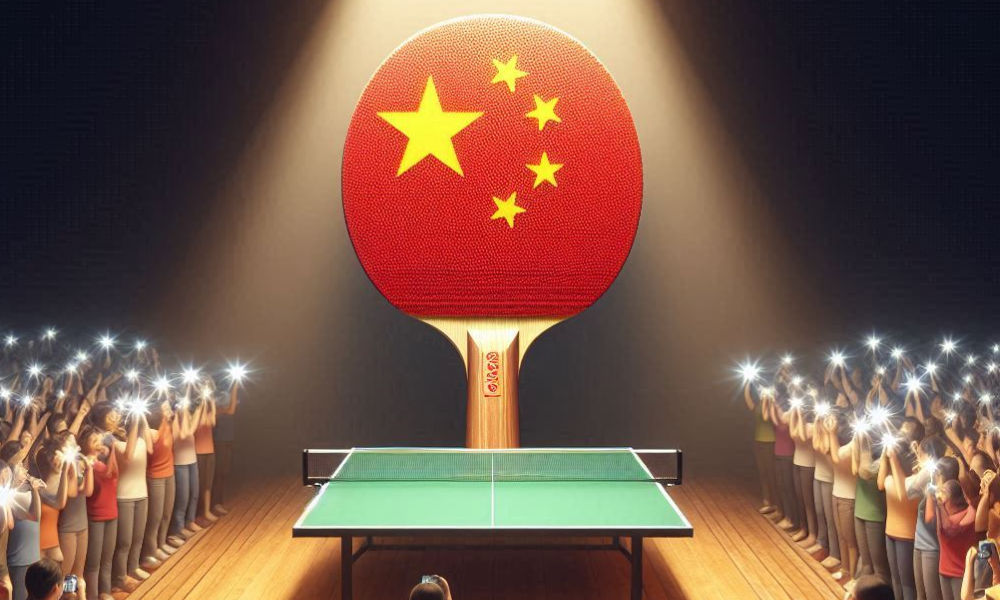
During the Paris Olympics, not a day went by without table tennis making its way onto Weibo’s trending lists. The Chinese table tennis team achieved great success, winning five gold medals and one silver.
However, the women’s singles final on August 3rd, between Chinese champions Chen Meng (陈梦) and Sun Yingsha (孙颖莎), took viewers by surprise due to the unsettling atmosphere. The crowd overwhelmingly supported Sun Yingsha, with little applause for Chen Meng, and some hurled insults at her. Even the coaching staff had stern expressions after Chen’s win.
This bizarre scene sparked heated discussions on Chinese social media, exposing the broader audience to the chaotic and sometimes absurd dynamics within China’s table tennis fandom.
“I welcome fans but reject fandom culture.”
When Sun Yingsha and Chen Meng faced off in the women’s singles final, the medal was destined for ‘Team China’ regardless of the outcome; the match should have been a celebration of Chinese table tennis.
However, the match held significant importance for both Sun and Chen individually. Chen Meng, the defending champion from the previous Olympics, was on the verge of making history by retaining her title. Meanwhile, Sun Yingsha, an emerging star who had already claimed singles titles at the World Cup and World Championships, was aiming to complete a career Grand Slam (World Championships, World Cup, and Olympics).

[center] Announcement of the Chen (L) vs Sun (R) match by People’s Daily on social media.[/center]
Sun Yingsha has clearly become a public favorite. On Weibo, the table tennis star ranked among the most beloved athletes in popularity lists.
This favoritism among Chinese table tennis fans was evident at the venue. According to reports from a Chinese audience member, anyone shouting “Go Chen Meng!” (“陈梦加油”) was quickly silenced or booed, while even cheering “Come on China!” (“中国队加油”) was met with ridicule. After Chen Meng’s 4-2 victory, many in the audience expressed their frustration and chanted “refund” during the award ceremony. Meanwhile, social media was flooded with hateful posts cursing Chen for winning the match.
For many who were unfamiliar with the off-court drama, the influence of fandom culture on the Olympics was shocking. However, in the world of Chinese table tennis, such extreme fan behavior has been brewing for some time. Even during the eras of Ma Long (马龙) and Zhang Jike (张继科), there were already fans who would turn against each other and others.
This year’s men’s singles champion, Fan Zhendong (樊振东), had long noticed the growing influence of fandom culture. In recent years, he has repeatedly voiced his discomfort with fan activities like “airport send-offs” and “fan meet-and-greets.” Earlier this year, he took to social media to reveal that he and his loved ones were being harassed by both overzealous fans and haters, and that he was considering legal action. He made it clear: “I welcome fans but reject fandom culture.” His consistent stance against fandom has helped cultivate a relatively rational fan base.
“What has happened to Chinese table tennis fans over the years?”
On Weibo, a blogger (@3号厅检票员工) posed a question that struck a chord with many, garnering over 30,000 likes: “What has happened to Chinese table tennis fans over the years?”
In the comments, many blamed Liu Guoliang (刘国梁) for fueling the fan culture around table tennis. Liu, the first Chinese male player to achieve the Grand Slam, retired in 2002 and then became a coach for the Chinese table tennis team. His coaching career has been highly successful, leading players like Ma Long and Xu Xin (许昕) to numerous championships.
Beyond coaching, Liu has been dedicated to commercializing table tennis. Compared to international tournaments in sports like tennis or golf, the prize money for Chinese table tennis players is only about one-tenth of those sports. Fan Zhendong has publicly stated on Weibo that the prize money for their competitions is too low compared to badminton. Liu believes table tennis has significant untapped commercial potential that has yet to be fully realized.
Under Liu’s leadership, the commercialization of the Chinese table tennis team began after the Rio Olympics, where China won all four gold medals. Viral internet memes like “Zhang Jike, wake up!” (继科你醒醒啊) and “The chubby guy who doesn’t understand the game” (不懂球的胖子) made both the sport and its athletes wildly popular in China.
Seeing the opportunity, Liu quickly increased the team’s exposure, encouraging players to create Weibo accounts, do live streams, star in films, and participate in variety shows. This approach rapidly turned the Chinese table tennis team into a “super influencer” in the Chinese sports world.
While this move has certainly increased the athletes’ visibility, it has also drawn criticism: is this kind of commercialization and celebrity status the right path for China’s table tennis? Successful commercialization requires a mature system for talent selection, team building, and athlete management. However, the selection process in Chinese table tennis remains opaque, the current team-building system shows little promise, and young athletes struggle to break through.
Additionally, athlete management appears amateurish. After watching an interview with Chinese tennis player Zheng Qinwen (郑钦文), a Douban netizen commented that Liu Guoliang’s plan for commercializing athletes is highly unprofessional—relying mainly on their personal charisma to attract attention. The most common criticism is that Liu and the Table Tennis Association should let professionals handle the professional work. Without a solid foundation for commercialization, the current focus on hype and marketing in Chinese table tennis may temporarily boost ticket sales but could ultimately backfire.
“Didn’t you say you want to crack down on fan culture?”
In response to the controversy surrounding the Chen vs. Sun match, the Beijing Daily published an article titled “How Can We Allow Fandom Violence to Disturb the World of Table Tennis?” The article addressed the growing problem of “fandom culture” infiltrating table tennis, a trend that originated in the entertainment world. It highlighted how extreme fan behavior, including online abuse and disruptive actions during matches, harms both the sport and the mental well-being of athletes. While fan enthusiasm is important, the article stressed that it must remain within rational limits.
This article foreshadowed actions taken shortly after. On August 7th, China’s Ministry of Public Security announced an online crackdown on chaotic sports-related fan circles. Social media platforms responded swiftly: Weibo deleted over 12,000 posts and banned more than 300 accounts, while Xiaohongshu, Bilibili, and Migu Video removed over 840,000 posts and banned or muted more than 5,300 accounts.
The campaign against fan culture sparked online debate. Some netizens criticized the official stance on “fandom” as overly simplistic. The Chinese term for “fandom,” 饭圈 (fànquān), contains a homophone for “fan,” referring to enthusiastic supporters of celebrities. In contemporary Chinese discourse, the term is often linked to the idol industry and carries negative, gender-biased connotations, particularly towards “irrational female fans chasing male idols.”
One Weibo post argued that commercialized sports, like football, are inherently tied to fan loyalty, belonging, and exclusivity. Disruptions among fans are not solely due to “fandom” but are often influenced by larger forces, such as capital or authorities. In the table tennis final, even the coaching team’s dissatisfaction with Chen Meng’s victory points to underlying problems beyond fan behavior.
While public backlash against “fandom” in sports often stems from concerns over its toxicity and violence, as blogger Yuyu noted, internal conflicts and power struggles have always existed in competitive sports. Framing these issues solely as “fandom problems” risks oversimplifying the situation and overlooks challenges such as commercialization failures, poor youth development, and internal factionalism within sports teams. The simplistic blame on “fandom culture” is seen by some as a distraction from these real issues, further fueling public frustration.
This public frustration is evident in a 2019 Weibo post and hashtag from People’s Daily. The five-year-old post personified China as a young male idol, promoting patriotism through fandom culture with the slogan “We all have an idol named ‘A Zhong’ (#我们都有一个爱豆名字叫阿中#)” [‘A Zhong’ was used as a nickname to refer to a personified China]. This promotion of ‘China’ as an idol with a 1.4 billion ‘fandom’ resurfaced during the Hong Kong protests.

Hashtag: “We all have an idol named Azhong” [nickname for China]
Now, after state media harshly criticized fandom culture, netizens have revisited the post, bringing it back into the spotlight. Recent comments on the post are filled with sarcasm, highlighting how fandom is apparently embraced when convenient and scapegoated when problems arise.

Post by People’s Daily promoting China as an “idol.”
“Didn’t you say you wanted to crack down on fan culture?” one commenter wondered.
Chen Meng, the Olympic table tennis champion, has also addressed the fan culture surrounding the 2024 Paris matches. She expressed her hope that, in the future, fans will focus more on the athletes’ “fighting spirit” on the field. True sports fans, she suggested, should be able to celebrate when their favorite athlete wins and accept it when they lose. “Because that’s precisely what competitive sports are all about,” she said.
By Ruixin Zhang
edited for clarity by Manya Koetse
Independently reporting China trends for over a decade. Like what we do? Support us and get the story behind the hashtag by subscribing:
Spotted a mistake or want to add something? Please let us know in comments below or email us. First-time commenters, please be patient – we will have to manually approve your comment before it appears.
©2024 Whatsonweibo. All rights reserved. Do not reproduce our content without permission – you can contact us at info@whatsonweibo.com.
Subscribe

The Viral Bao’an: How a Xiaoxitian Security Guard Became Famous Over a Pay Raise

The Hashtagification of Chinese Propaganda

Hidden Hotel Cameras in Shijiazhuang: Controversy and Growing Distrust

Death of Chinese Female Motorcycle Influencer ‘Shigao ProMax’ Sparks Debate on Risky Rides for Online Attention

Why the “人人人人景点人人人人” Hashtag is Trending Again on Chinese Social Media

About Wang Chuqin’s Broken Paddle at Paris 2024

“Land Rover Woman” Sparks Outrage: Qingdao Road Rage Incident Goes Viral in China

China at Paris 2024 Olympics Trend File: Medals and Moments on Chinese Social Media

Weibo Watch: The Land Rover Woman Controversy Explained

Stolen Bodies, Censored Headlines: Shanxi Aorui’s Human Bone Scandal

Fired After Pregnancy Announcement: Court Case Involving Pregnant Employee Sparks Online Debate

Weibo Watch: Going the Wrong Way

Team China’s 10 Most Meme-Worthy Moments at the 2024 Paris Olympics

Weibo Watch: Shaping Olympic Narratives

“No Kimonos Allowed” – Ongoing Debate on Japanese Attire in China
Get in touch
Would you like to become a contributor, or do you have any tips or suggestions? Get in touch here!
Popular Reads
-

 China Insight6 months ago
China Insight6 months agoThe Tragic Story of “Fat Cat”: How a Chinese Gamer’s Suicide Went Viral
-

 China Music7 months ago
China Music7 months agoThe Chinese Viral TikTok Song Explained (No, It’s Not About Samsung)
-

 China Insight8 months ago
China Insight8 months agoThe ‘Two Sessions’ Suggestions: Six Proposals Raising Online Discussions
-

 China Insight11 months ago
China Insight11 months agoThe Story of Li Jun & Liang Liang: How the Challenges of an Ordinary Chinese Couple Captivated China’s Internet





